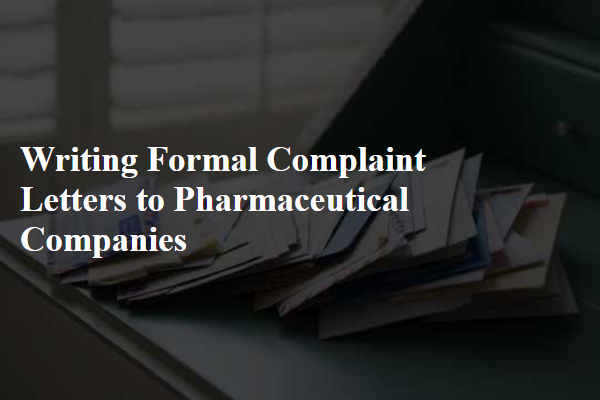
When writing formal complaint letters to pharmaceutical companies, clearly state the issue with precise details such as product name, batch number, and date of purchase to ensure accurate identification. Maintain a professional tone, express your concerns objectively, and request specific actions or remedies to address the problem. Including relevant documentation like receipts or medical records can support your claim and facilitate a timely resolution.
Subject of Complaint
Writing formal complaint letters to pharmaceutical companies requires clarity and professionalism. It is important to clearly state the issue while maintaining a respectful tone.
Begin by identifying the specific product or service and describing the problem in detail. Include any relevant dates, batch numbers, or clinical data to support your claim. Conclude the letter by requesting a specific resolution or response within a reasonable timeframe.
Product Details
| Aspect | Details |
|---|---|
| Purpose | To formally address concerns regarding pharmaceutical products, services, or business practices |
| Recipient | Pharmaceutical company's customer service department, quality assurance team, or regulatory affairs office |
| Structure | Introduction, detailed description of the complaint, supporting evidence, desired resolution, polite closing |
| Introduction | Clearly state the purpose of the letter and the specific product or service involved |
| Details | Provide precise information about the issue such as product name, lot number, purchase date, and nature of the problem |
| Evidence | Include documentation like receipts, medical reports, or photographs supporting the complaint |
| Resolution | Specify the action you expect, which may include refund, replacement, or investigation |
| Tone | Maintain professional, respectful, and objective language throughout the letter |
| Follow-up | Request confirmation of receipt and timeline for response |
| Additional Tips | Use formal salutations and closings; keep the letter concise and focused; proofread for clarity and grammar |
Incident Description
How can you effectively write a formal complaint letter to a pharmaceutical company? A clear and concise structure is essential when addressing issues related to medication quality or customer service. Providing specific details such as product name, batch number, and date of purchase enhances the credibility of your complaint.
Date and Location of Occurrence
Writing formal complaint letters to pharmaceutical companies requires clear and concise communication. It is essential to state the specific issue related to the medication or service promptly.
Include relevant details such as product name, batch number, and date of purchase to support your complaint. Maintaining a professional tone increases the likelihood of a constructive response from the company.
Affected Parties
Writing formal complaint letters to pharmaceutical companies requires clear and concise expression of the issue experienced with a specific medication or service. Include essential details such as product name, batch number, purchase date, and a thorough description of the problem to ensure accurate assessment. Request prompt resolution or compensation while maintaining a professional and respectful tone throughout the correspondence.
Supporting Evidence
Writing formal complaint letters to pharmaceutical companies requires clear and concise communication. It is essential to include specific details such as product name, batch number, and the issue encountered.
Providing evidence like receipts or medical reports strengthens the complaint's validity. Contact information should be clearly stated to facilitate prompt responses from the company's customer service or quality control departments.
Previous Correspondence
Writing formal complaint letters to pharmaceutical companies requires clear communication and precise details. Such letters should focus on the issue, provide relevant evidence, and request appropriate resolution.
- Identify the Issue - Clearly describe the problem related to the pharmaceutical product or service.
- Include Supporting Evidence - Attach receipts, batch numbers, medical reports, or correspondence that substantiate the complaint.
- Specify Desired Outcome - State the compensation, replacement, or corrective action you expect from the company.
Desired Resolution
Writing formal complaint letters to pharmaceutical companies requires clear identification of the issue related to the medication or service received. Include specific details such as drug name, batch number, and dates of purchase or adverse effects experienced to ensure precise communication. A concise, respectful tone enhances the likelihood of a timely and effective response from the pharmaceutical company's customer service department.
Legal and Regulatory References
Writing formal complaint letters to pharmaceutical companies requires clarity and professionalism. Effective letters focus on specific issues and desired resolutions to facilitate prompt action.
- Identify the issue clearly - Precisely describe the problem related to the medication or service to avoid misunderstandings.
- Provide supporting evidence - Include relevant details such as batch numbers, prescription information, and dates to strengthen your case.
- State the desired outcome - Clearly communicate the resolution you expect, whether it is a refund, replacement, or further investigation.
Contact Information
Writing formal complaint letters to pharmaceutical companies requires clarity and professionalism. These letters address specific concerns related to products or services, ensuring proper documentation of issues.
- Identify the issue - Clearly specify the problem with the medication or service to provide precise context.
- Include relevant details - Add batch numbers, purchase dates, and any medical reports to support your complaint.
- State desired resolution - Express what outcome or compensation you expect from the company.
Maintaining a respectful tone and thorough documentation enhances the effectiveness of your formal complaint letter.



Comments